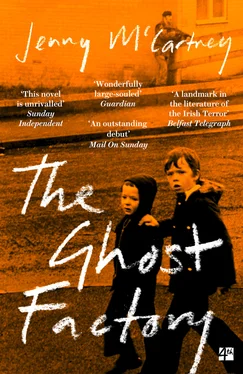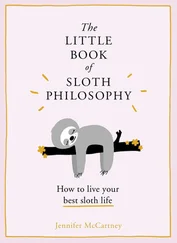At the time Titch nicked the Jaffa Cakes the armed gangs in Northern Ireland had been fighting for over twenty-five years, and they had only recently grown weary of it. They had differing aspirations for our little state of six counties and one and a half million people. The IRA wanted a united Ireland, while the Loyalist UVF and the UDA preferred us to stay part of the United Kingdom. They had formerly reached consensus on one thing, though, which was that the best way to persuade ordinary folk on the other side of the sincerity of your argument was to build a large stack of their corpses and promise more of the same until your demands were secured.
We called our situation the Troubles, and the longer it had dragged on the more fitting that genteel euphemism became. The murdering was sporadic but fully expected, like some recurrent, rumbling agony in your unmentionables. The populace soldiered on through it, mainly keeping their heads down and quietly hoping that splashes of terror didn’t land on or near them. In between shootings and bombs there were businesses to be run and children to be raised. Things didn’t fall apart, quite. They kept on, but more painfully.
At long last the killing had grown stale, even for past enthusiasts. The whole thing had lost its mojo. No one knew where it was headed any more. All armed groups had recently agreed to stop the violence – the headline stuff, at least – while they reconsidered their options.
Given what had gone before, this period of relative calm was much appreciated, but energies need somewhere to strut their stuff. Muscles require flexing. Now that the loyalists were no longer officially engaged in killing Catholics, they had begun to consider more closely the question of discipline nearer home. Certain young Prods were stepping out of line, giving cheek, failing now to understand the long-established principle of who was in charge. They needed to be dealt with.
I had concerns that Titch, who had never before been considered an example to anyone, might finally become one now.
In our house, we had never been big fans of the local paramilitaries. Big Jacky didn’t sound off about it beyond the front door, because in our neighbourhood you never got anything but grief by gabbing. But he used to tell me how in the days before this bother got started he would dander freely up the Falls, and Catholics came over here without any problem. Now we were walled off from each other in raging wee cantons.
Like his father before him, Big Jacky stood up in grave reverence for ‘God Save the Queen’ and scrupulously arranged the poppy in his lapel on Remembrance Day. He had a notion of Britain that I couldn’t quite boil down, but that stood for something larger and more historic than the territorial daubs of red, white and blue that marked the kerbstones near our house. A photograph of his grandfather who died at the Somme stared out at us, handsome and doomed, from a frame on the bookshelf. Big Jacky said to me from when I was small that all this killing ever did was slather on misery.
So when the young fellas came to the door collecting money for ‘the prisoners’ he would say gently, ‘Och boys, sure I have my own charities, and it’s hard enough now just to pay the rates,’ steering them on their way as though he had already forgiven them their presumption in asking.
They mostly seemed to take it okay, although once I saw a younger guy give him glowering looks, muttering about freeloaders being made to pay the price or get the fuck out, before the older guy with him quickly whispered something to shut him up.
Big Jacky had lived around there for a long time, I suppose, and he knew some of the players from school to nod to, but I understood that wasn’t the only reason why he got more leeway than most.
It was this: once or twice a week, Big Jacky helped out at a club down the road for disabled kids, and he had got especially close to one wee boy there called Tommy.
Tommy’s legs were heavily unreliable, which meant he needed a wheelchair, but every so often he could flash you a smile of heart-liquefying sweetness which he used to his advantage. His speech was slow and woolly, and you had to bend right down next to his mouth to make out what he was saying, but his mind was sharp. With his snappy observations and his pale, fragile body, he was a Venus fly trap masquerading as an orchid.
The club was run by a bosomy, middle-aged woman called Barbara, an energetic matriarch who made up in practicality what she lacked in imagination. What creative flair she did have went into her hair, dramatic stabs at glamour which varied wildly in their success rates. Hairdressers rubbed their hands at her approach like pushers welcoming a star junkie.
Given his difficulty in speaking, Tommy was tight with his words, but he had great timing. One afternoon I walked in to look for Big Jacky and Tommy immediately started agitating for me with his arms. I got up close to hear him say in his distinctive voice, as if transmitting from several leagues under the sea, ‘Barbara’s had her hair done.’
The next second big Barbara steamed into view, dead serious beneath a majestically awful new custard-coloured bouffant, and the pair of us cracked up.
Tommy’s dad was a very senior Loyalist, above even the likes of McMullen in the hierarchy, and – despite his readiness to okay the shattering of other families – he dearly loved Tommy, who held a place in the one small compartment of his heart that had not yet ossified. He had a slack face and hard-working eyes, and he observed how much Tommy liked Big Jacky, who was endlessly patient with him, taking him back and forth to the toilet without complaint and listening carefully to whatever he said.
Big Jacky didn’t like Tommy’s dad, though. I could see that in the tension of his jaw in the man’s presence, the way his natural reticence retreated even further into the guarded handover of monosyllables. But he gave him the minimal courtesy due to any father of Tommy’s. And perhaps because of this chance connection down at the club, Big Jacky never had too much trouble from anyone. You couldn’t rely on that, though. You couldn’t rely on anything.
Mrs Hackett in the corner shop sometimes filled me in on stuff that was going on locally, so long as no one else was in earshot. I had learned that good timing and a modest outlay on a tin of Buitoni ravioli and a packet of Punjana teabags could purchase some thought-provoking snippets. She had long ago developed the habit of confiding in Big Jacky – something perhaps to do with the natural fraternity of shopkeepers in a volatile city – and now it had transferred to me. What Mrs Hackett wasn’t told, she overheard. She was an assiduous wee gatherer of information. I couldn’t be entirely sure of its direction of flow, even though I trusted to her good intentions, and so I never told her anything I didn’t want others to know. Given my caginess, that limited the scope of our chat, but I kept the ball in the air with pleasantries. Thank God for the weather in all its variations.
‘Another oul rainy day,’ I observed.
‘Och, will it ever stop?’
As she handed me my change she took a quick squint down the central aisle of the wee shop, then right and left. A signal to linger. She leaned over the counter and whispered: ‘Say nothing but there was another beating last week.’
‘Who was it?’
‘A wee boy from Arnold Street. Only sixteen. I know his mother. She was in this morning in an awful state, a bag of nerves.’
‘What happened to him?’
‘Four of them jumped on him on his way home and battered him with iron bars. He’s up there in the Royal now. Head injuries, broken leg.’
‘What was it over?’
‘Some row over a girl, his mother said. Him and another lad argued over a girl but it got out of hand and the other boy’s uncle is, you know.’
Читать дальше












